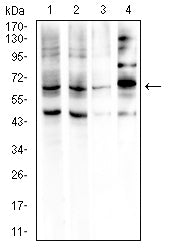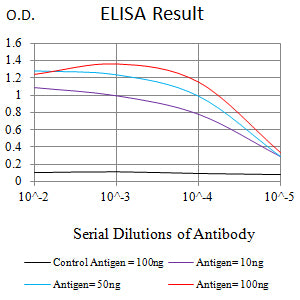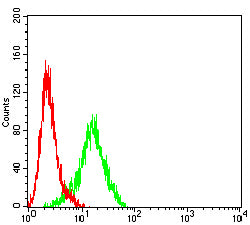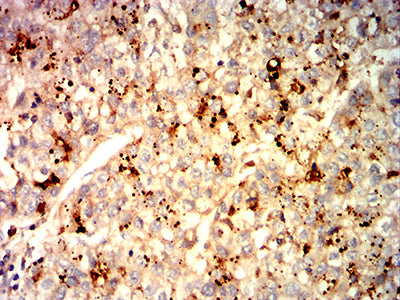



| WB | 1/500 - 1/2000 | Human,Mouse,Rat |
| IF | 咨询技术 | Human,Mouse,Rat |
| IHC | 1/200-1/1000 | Human,Mouse,Rat |
| ICC | 技术咨询 | Human,Mouse,Rat |
| FCM | 1/200-1/400 | Human,Mouse,Rat |
| Elisa | 1/10000 | Human,Mouse,Rat |
| Aliases | SGB; DGSX; MXR7; SDYS; SGBS; OCI-5; SGBS1; GTR2-2 |
| Entrez GeneID | 2719 |
| clone | 2A2C3 |
| WB Predicted band size | 65.5kDa |
| Host/Isotype | Mouse IgG1 |
| Antibody Type | Primary antibody |
| Storage | Store at 4°C short term. Aliquot and store at -20°C long term. Avoid freeze/thaw cycles. |
| Species Reactivity | Human, Mouse |
| Immunogen | Purified recombinant fragment of human GPC3 (AA: 55-200) expressed in E. Coli. |
| Formulation | Purified antibody in PBS with 0.05% sodium azide |
+ +
以下是3-4篇关于GPC3抗体的代表性文献概览:
---
1. **文献名称**: *"A Glypican-3-targeted Antibody-Drug Conjugate Exhibits Potent Antitumor Activity Against Hepatocellular Carcinoma"*
**作者**: Zhou F et al.
**摘要**: 本研究开发了一种靶向GPC3的抗体药物偶联物(ADC),通过体外和体内实验证明其在肝癌模型中显著抑制肿瘤生长,且对正常组织毒性较低,为肝癌靶向治疗提供了新策略。
---
2. **文献名称**: *"Phase I Study of Anti-Glypican-3 CAR-T Cells in Advanced Hepatocellular Carcinoma"*
**作者**: Saung MT et al.
**摘要**: 首次报道了靶向GPC3的CAR-T细胞治疗晚期肝细胞癌的I期临床试验,结果显示可控的安全性和初步抗肿瘤活性,部分患者达到疾病稳定或部分缓解。
---
3. **文献名称**: *"Glypican-3 as a Immunohistochemical Marker for Distinguishing Hepatocellular Carcinoma from Benign Liver Lesions"*
**作者**: Shafizadeh N et al.
**摘要**: 通过免疫组化分析,证实GPC3抗体在肝细胞癌诊断中具有高特异性(90%)和中等敏感性(55%),优于传统标志物AFP,可用于肝癌病理鉴别。
---
4. **文献名称**: *"A Bispecific Antibody Targeting GPC3 and CD3 Enhances T Cell-Mediated Cytotoxicity Against Hepatocellular Carcinoma"*
**作者**: Li W et al.
**摘要**: 设计了一种同时靶向GPC3和CD3的双特异性抗体,体外实验显示其可有效激活T细胞并特异性杀伤GPC3阳性肝癌细胞,为肝癌免疫治疗提供了新方向。
---
**备注**: 以上文献发表于2014-2022年间,涵盖诊断、靶向治疗(ADC、CAR-T、双抗)等方向,反映GPC3抗体在肝癌领域的多元化应用。如需具体文献链接或补充更多研究,可进一步说明。
**Background of GPC3 Antibodies**
Glypican-3 (GPC3), a member of the glypican family of heparan sulfate proteoglycans, is a cell surface protein anchored via a glycosylphosphatidylinositol (GPI) linkage. It plays critical roles in embryonic development, particularly in cell growth and differentiation, but is minimally expressed in most normal adult tissues. Dysregulation of GPC3 is strongly associated with several cancers, notably hepatocellular carcinoma (HCC), where it is overexpressed in 70-80% of cases. It is also implicated in melanoma, ovarian cancer, and Wilms' tumor.
GPC3's tumor-specific expression and involvement in oncogenic pathways—such as Wnt/β-catenin and Yap signaling—make it a promising therapeutic and diagnostic target. Antibodies targeting GPC3 have been developed for both immunotherapy and diagnostics. In therapeutics, monoclonal antibodies (e.g., codrituzumab, YP7) exert anti-tumor effects via antibody-dependent cellular cytotoxicity (ADCC) or by delivering conjugated cytotoxic agents. CAR-T cells and bispecific antibodies targeting GPC3 are also under investigation.
Diagnostically, GPC3 antibodies are used in immunohistochemistry to distinguish HCC from benign liver lesions and in serum assays for early cancer detection. Challenges include optimizing specificity to minimize off-target effects and enhancing antibody penetration in solid tumors. Ongoing research focuses on combinatorial therapies and biomarker-driven approaches to maximize clinical efficacy.
×